What are the steps to build a php website?
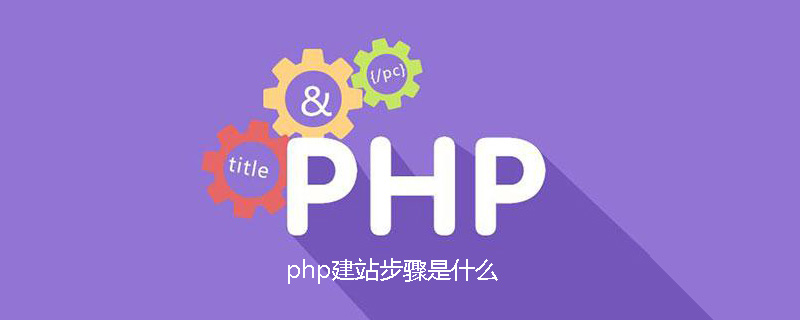
1. Conditions and environment preparation
First of all, you need to figure out what hardware conditions are required, what basic elements are needed to build a website locally, and the various The role of elements. The editor has compiled the following common software that is necessary for quickly building a website.
1. Php: Chinese name, hypertext preprocessor, relying on the web server, used to parse web pages written in php language, so that web pages are presented as html pages that we come into contact with daily;
2. Apache server: A very powerful web server, similar to the IIS server in the windows environment. It is like a container. After the web application is placed in it, the user can access the website in the specified directory through the browser. Interact with it;
3. Mysql database: Not much to say, everyone basically knows that it is used to store website data;
4. phpMyAdmin: a database management software, generally used for Backend management is mainly used to facilitate the operation of mysql;
5. WordPress program: a simple website program that is suitable for all novice webmasters.
2. Setting up the Apache server
1. First unzip the installed Apache software. Generally, the downloaded programs are compiled programs, so you only need to perform the necessary steps. Configure and install successfully.
2. Open the console as an administrator and use the command to install the program.
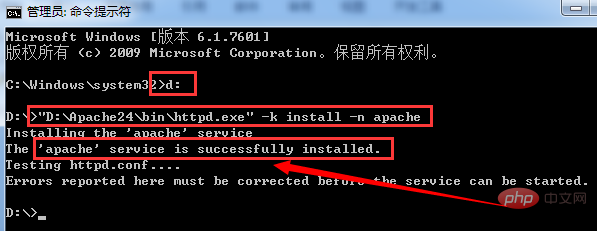
Then enter the services.msc command in the console, enter the service desk, and check whether apache is installed successfully.
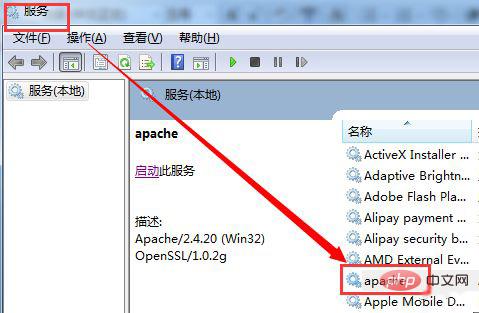
Related recommendations: "PHP Tutorial"
After the above configuration, you can find that there is an extra apache in the service console name. If there is this service before the Apache server is installed, it means that this computer has been installed before. You can configure it directly. If you want to reinstall, you need to delete the service first, otherwise you will need to delete it during the installation process. You will encounter a lot of troublesome problems. Delete the command: sc delete apache. You can also delete it by opening the console with administrator permissions and entering this command.
3. Start the Apache server
Enter the decompressed folder of Apache, enter the bin directory, find the ApacheMonitor.exe file, and click it.
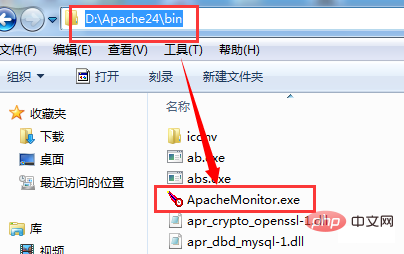
# Then a window will pop up, click Start to start the Apache service.
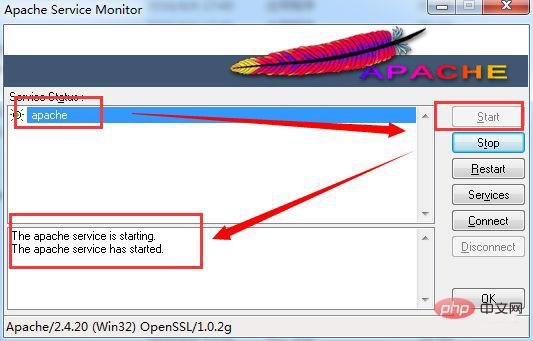
The establishment of Apache is so simple. Here I would like to remind webmaster friends that when downloading Apache from the official website, you must clearly check the compatible VC environment and install the matching Install Apache after using VC, otherwise you will get an error during the installation process.
3. PHP environment configuration
1. Similarly, the PHP module selection is also an installation-free version. You can directly unzip it to the folder you are accustomed to and configure it. Please remind the webmaster. When downloading from the official website, you should also pay attention to system and VC environment support. The decompression path is as follows:
Enter the decompression directory of php, find either php.ini-production or php.ini-development, and rename it to php.ini; then change D:\php\ext and D:\ php\Add to the environment variable PATH of the system variables
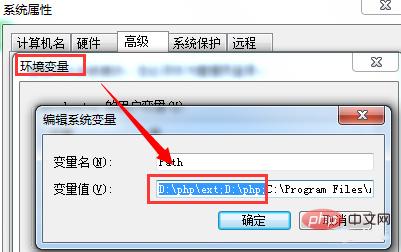
2. Configure php.ini
The configuration mentioned here is mainly to enable several common php extensions Projects can be opened as needed. Open the php.ini file with Notepad and configure it as follows:
(1), find; extension_dir = "ext", remove the semicolon in front
(2), find; extension=php_mbstring .dll, remove the semicolon in front
(3), find; extension=php_mysqli.dll, remove the semicolon in front
(4), find; extension=php_pdo_mysql.dll, remove The preceding semicolon
php environment means that the configuration is completed. We will mention loading the php module in the Apache configuration file later.
4. Mysql configuration and installation
1. The Mysql I want to talk about here is also an installation-free version. You can directly unzip it to the folder configuration you are accustomed to naming. The decompression path As shown below:
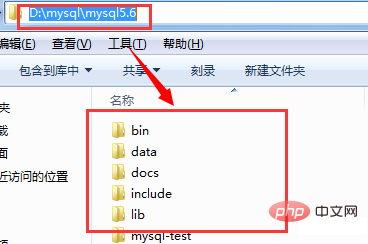
2. Configure my-default.ini
Enter this path and find my-default.ini, open it with Notepad, and modify the file The values of basedir and datadir in the content are mainly to fill in the installation path and the path where data is saved. Correctly fill in the following figure:
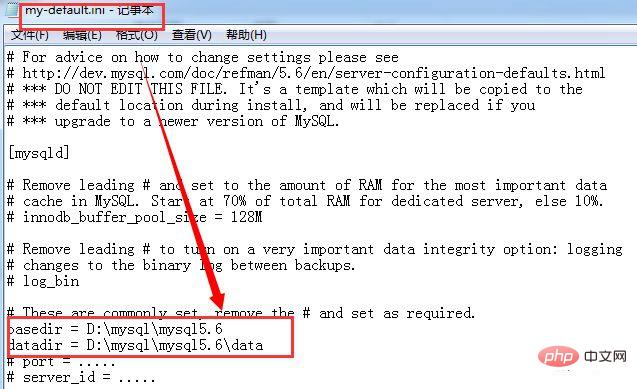
3. Configure environment variables
Copy the bin directory path decompressed by Mysql to the system environment, separated by semicolons, as shown below:
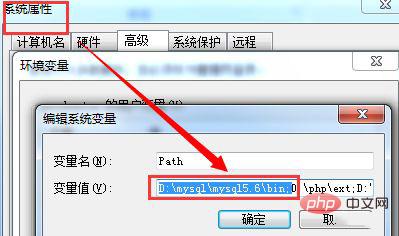
4. Install Mysql service
Open the console with administrator rights, find the bin directory where Mysql is installed, and then use the mysqld –install command to install it. The installation is successful as shown below:
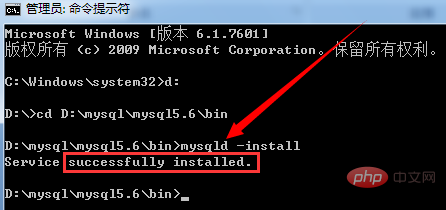
Then use the command net start mysql to start the database. The configuration and installation of the Mysql database ends here.
5. Configure the Apache server
After configuring the php environment and installing Mysql, you need to make changes to the Apache configuration file to facilitate the next step. Analysis of php website.
Use Notepad to open the file D:\Apache24\conf\httpd.conf. Since the latest version of Apache's ServerRoot is enabled by default, and the relative path is used based on the root path after decompression, it is basically not needed. Changes, here we only talk about the attributes and modules that need to be changed.
1. Find DirectoryIndex. Since it is a website program developed by PHP, add index.php;
2. Add the PHP module to let apache support PHP. Since the editor uses PHP7, so in At the end of the configuration file, add the following code:
LoadModule php7_module "D:/php/php7apache2_4.dll"
AddType application/x-httpd-php .php
PHPIniDir " D:/php" *Inform Apache of the location of php.ini*
The specific screenshot is as follows:
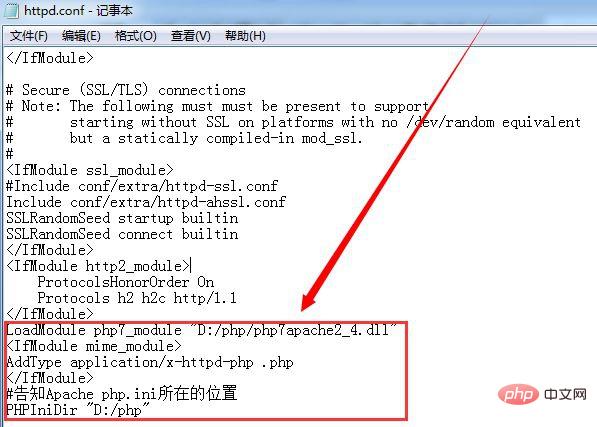
At this point, the basic configuration of httpd.conf is completed. Save httpd.conf. If you want to add some modules or enable some module functions to the subsequent website, you will basically make changes in this configuration file.
6. WordPress website configuration
Just download it from the official website of WordPress, then copy the compressed package to the path D:\Apache24\htdocs and decompress it. Since Apache's DocumentRoot path has been defined as the htdocs directory, you can directly jump to the WordPress configuration interface by accessing http://localhost locally. As shown below:
The above is the detailed content of What are the steps to build a php website?. For more information, please follow other related articles on the PHP Chinese website!

Hot AI Tools

Undresser.AI Undress
AI-powered app for creating realistic nude photos

AI Clothes Remover
Online AI tool for removing clothes from photos.

Undress AI Tool
Undress images for free

Clothoff.io
AI clothes remover

Video Face Swap
Swap faces in any video effortlessly with our completely free AI face swap tool!

Hot Article

Hot Tools

Notepad++7.3.1
Easy-to-use and free code editor

SublimeText3 Chinese version
Chinese version, very easy to use

Zend Studio 13.0.1
Powerful PHP integrated development environment

Dreamweaver CS6
Visual web development tools

SublimeText3 Mac version
God-level code editing software (SublimeText3)

Hot Topics
 1664
1664
 14
14
 1423
1423
 52
52
 1318
1318
 25
25
 1269
1269
 29
29
 1248
1248
 24
24
 Explain JSON Web Tokens (JWT) and their use case in PHP APIs.
Apr 05, 2025 am 12:04 AM
Explain JSON Web Tokens (JWT) and their use case in PHP APIs.
Apr 05, 2025 am 12:04 AM
JWT is an open standard based on JSON, used to securely transmit information between parties, mainly for identity authentication and information exchange. 1. JWT consists of three parts: Header, Payload and Signature. 2. The working principle of JWT includes three steps: generating JWT, verifying JWT and parsing Payload. 3. When using JWT for authentication in PHP, JWT can be generated and verified, and user role and permission information can be included in advanced usage. 4. Common errors include signature verification failure, token expiration, and payload oversized. Debugging skills include using debugging tools and logging. 5. Performance optimization and best practices include using appropriate signature algorithms, setting validity periods reasonably,
 PHP Program to Count Vowels in a String
Feb 07, 2025 pm 12:12 PM
PHP Program to Count Vowels in a String
Feb 07, 2025 pm 12:12 PM
A string is a sequence of characters, including letters, numbers, and symbols. This tutorial will learn how to calculate the number of vowels in a given string in PHP using different methods. The vowels in English are a, e, i, o, u, and they can be uppercase or lowercase. What is a vowel? Vowels are alphabetic characters that represent a specific pronunciation. There are five vowels in English, including uppercase and lowercase: a, e, i, o, u Example 1 Input: String = "Tutorialspoint" Output: 6 explain The vowels in the string "Tutorialspoint" are u, o, i, a, o, i. There are 6 yuan in total
 Explain late static binding in PHP (static::).
Apr 03, 2025 am 12:04 AM
Explain late static binding in PHP (static::).
Apr 03, 2025 am 12:04 AM
Static binding (static::) implements late static binding (LSB) in PHP, allowing calling classes to be referenced in static contexts rather than defining classes. 1) The parsing process is performed at runtime, 2) Look up the call class in the inheritance relationship, 3) It may bring performance overhead.
 What are PHP magic methods (__construct, __destruct, __call, __get, __set, etc.) and provide use cases?
Apr 03, 2025 am 12:03 AM
What are PHP magic methods (__construct, __destruct, __call, __get, __set, etc.) and provide use cases?
Apr 03, 2025 am 12:03 AM
What are the magic methods of PHP? PHP's magic methods include: 1.\_\_construct, used to initialize objects; 2.\_\_destruct, used to clean up resources; 3.\_\_call, handle non-existent method calls; 4.\_\_get, implement dynamic attribute access; 5.\_\_set, implement dynamic attribute settings. These methods are automatically called in certain situations, improving code flexibility and efficiency.
 PHP and Python: Comparing Two Popular Programming Languages
Apr 14, 2025 am 12:13 AM
PHP and Python: Comparing Two Popular Programming Languages
Apr 14, 2025 am 12:13 AM
PHP and Python each have their own advantages, and choose according to project requirements. 1.PHP is suitable for web development, especially for rapid development and maintenance of websites. 2. Python is suitable for data science, machine learning and artificial intelligence, with concise syntax and suitable for beginners.
 PHP in Action: Real-World Examples and Applications
Apr 14, 2025 am 12:19 AM
PHP in Action: Real-World Examples and Applications
Apr 14, 2025 am 12:19 AM
PHP is widely used in e-commerce, content management systems and API development. 1) E-commerce: used for shopping cart function and payment processing. 2) Content management system: used for dynamic content generation and user management. 3) API development: used for RESTful API development and API security. Through performance optimization and best practices, the efficiency and maintainability of PHP applications are improved.
 PHP: A Key Language for Web Development
Apr 13, 2025 am 12:08 AM
PHP: A Key Language for Web Development
Apr 13, 2025 am 12:08 AM
PHP is a scripting language widely used on the server side, especially suitable for web development. 1.PHP can embed HTML, process HTTP requests and responses, and supports a variety of databases. 2.PHP is used to generate dynamic web content, process form data, access databases, etc., with strong community support and open source resources. 3. PHP is an interpreted language, and the execution process includes lexical analysis, grammatical analysis, compilation and execution. 4.PHP can be combined with MySQL for advanced applications such as user registration systems. 5. When debugging PHP, you can use functions such as error_reporting() and var_dump(). 6. Optimize PHP code to use caching mechanisms, optimize database queries and use built-in functions. 7
 The Enduring Relevance of PHP: Is It Still Alive?
Apr 14, 2025 am 12:12 AM
The Enduring Relevance of PHP: Is It Still Alive?
Apr 14, 2025 am 12:12 AM
PHP is still dynamic and still occupies an important position in the field of modern programming. 1) PHP's simplicity and powerful community support make it widely used in web development; 2) Its flexibility and stability make it outstanding in handling web forms, database operations and file processing; 3) PHP is constantly evolving and optimizing, suitable for beginners and experienced developers.





